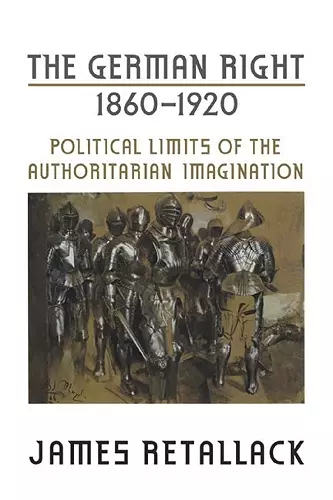The German Right, 1860-1920
Political Limits of the Authoritarian Imagination
Format:Paperback
Publisher:University of Toronto Press
Published:26th Aug '06
Currently unavailable, and unfortunately no date known when it will be back

'In this book James Retallack brings together two decades of reading, reflection, and research on the German right. No historian has done more to illuminate the painful choices that German conservatives confronted as they struggled to survive the challenges of democracy and social change. The German Right contains some of his ground breaking research on Prussia and Saxony, as well as his critical reflections on changing trends in historiography. A book to be read and pondered by every serious student of the German Kaiserreich. ' -- James J. Sheehan, Dickason Professor in the Humanities and Professor of History, Stanford University Professor of History, Stanford University 'James Retallack again demonstrates that his is a powerful and persuasive voice in Modern German history. In The German Right, Retallack stakes out a revisionist argument for understanding the political continuities of the German past, and in the process breathes new life into a deflated debate about Germany's "Sonderweg." What emerges is a new interpretation of modern German history, focusing on a highly contextualized political history of the German right from the middle of the nineteenth century into the maelstrom of the twentieth.' -- Helmut Walser Smith, Martha Rivers Ingram Professor of History, Director, Robert Penn Warren Center for the Humanities, Vanderbilt University Robert Penn Warren Center for the Humanities, Vanderbilt University
Written with clear, persuasive prose, this wide-ranging analysis draws together threads of reasoning from German and Anglo-American scholars over the past 30 years and points the way for future research into unexplored areas.
Before the rise of Hitler and the Nazis, Germany was undergoing convulsive socioeconomic and political change. With unification as a nation state under Bismarck in 1871, Germany experienced the advent of mass politics, based on the principle of one man, one vote. The dynamic, diverse political culture that emerged challenged the adaptability of the 'interlocking directorate of the Right.' To serve as a bulwark of the authoritarian state, the Right needed to exploit traditional sources of power while mobilizing new political recruits, but until Emperor Wilhelm II's abdication in 1918 these aims could not easily be reconciled.
In The German Right, 1860-1920, James Retallack examines how the authoritarian imagination inspired the Right and how political pragmatism constrained it. He explores the Right's regional and ideological diversity, and refuses to privilege the 1890s as the tipping point when the traditional politics of notables gave way to mass politics. Retallack also challenges the assumption that, if Imperial Germany was modern, it could not also have been authoritarian. Written with clear, persuasive prose, this wide-ranging analysis draws together threads of reasoning from German and Anglo-American scholars over the past 30 years and points the way for future research into unexplored areas.
"'James Retallack again demonstrates that his is a powerful and persuasive voice in Modern German history. In The German Right, Retallack stakes out a revisionist argument for understanding the political continuities of the German past, and in the process breathes new life into a deflated debate about Germany's "Sonderweg." What emerges is a new interpretation of modern German history, focusing on a highly contextualized political history of the German right from the middle of the nineteenth century into the maelstrom of the twentieth.' - Helmut Walser Smith, Martha Rivers Ingram Professor of History, Director, Robert Penn Warren Center for the Humanities, Vanderbilt University."
ISBN: 9780802094193
Dimensions: 229mm x 153mm x 23mm
Weight: 720g
416 pages